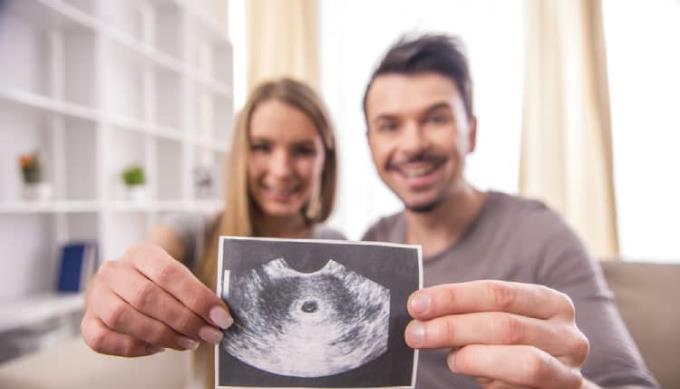Ultrasound of the first trimester is extremely important that pregnant mothers need to perform to determine whether your baby is "nesting" properly in your uterus or not.
The first pregnancy ultrasound can be quite interesting and especially for new mothers, because this is the first moment you see your baby growing in your womb. If you are worried about this first pregnancy ultrasound, relax and relax. Most ultrasound tests are safe and painless for mother and baby. Here are some essential information that aFamilyToday Health thinks you should find out before having your first pregnancy ultrasound.
First trimester ultrasound - what do you need to know?
The first trimester is an extremely important period, mothers need to be monitored and supported regularly to ensure the fetus "implements" and develops properly. In addition, the first 3-month pregnancy ultrasound results will also help doctors to detect health problems of mother and baby early to take appropriate preventive measures. For a normal, average pregnancy, you'll need a pregnancy ultrasound about four times during the first trimester.
Why do you need a pregnancy ultrasound in the first 3 months?
The first trimester ultrasound is very important because it will help you:
Make sure you are pregnant
Determine the location of the fetus: whether the fetus is in or out of the uterus
Determine gestational age and due date
Diagnose and prevent birth defects
Check the fetal heart rate
Determine the number of fetuses you are carrying ...
Ultrasound of the first trimester will help you see if your baby is at risk for genetic diseases caused by a chromosomal disorder, such as Down syndrome and Trisomy 18 .
Down syndrome is an inherited mental condition that causes learning disabilities and certain body characteristics that last a lifetime, while Trisomy 18 makes it difficult for a baby to survive after birth.
However, first trimester fetal ultrasound does not predict other birth defects such as spina bifida . This disability is usually identified through other tests in the second and third trimesters.
3-head pregnancy ultrasound is extremely important for the following subjects:
Women with irregular periods, it is difficult to determine the due date
Women with a history of miscarriage or stillbirth
Suspected cases of ectopic pregnancy
At what time will the fetal ultrasound scans in the first 3 months be performed?

Health experts recommend that you should have your first pregnancy ultrasound around 6 weeks of pregnancy, which means you are about 2 weeks late for your period. At this stage, your doctor will mainly do a vaginal ultrasound.
The next pregnancy ultrasound will be between 11 and 13 weeks of pregnancy and will be performed through the abdominal wall. A pregnancy ultrasound will be done more often if you:
Bleeding during pregnancy
Multiple pregnancy
Pregnant women over 35 years old and pregnant for the first time
Pregnant women with cysts, fibroids or other medical conditions
How is the first 3-month pregnancy ultrasound performed?
First trimester ultrasound will include the following 2 steps:
Blood tests
Supersonic
The vaginal ultrasound is the method most commonly used when the fetus is less than 10 weeks old . The reason is that at this time the fetus is too young, other methods will not be able to see clearly.
When done, a gel-lubricated probe is inserted into the vagina, the probe emits sound waves to collect images of the baby and create images on the computer screen. Having to do this can be confusing and uncomfortable, but not painful. Taking a deep breath and relaxing when the probe is inserted will help reduce discomfort.
If you do an ultrasound over the abdominal wall, the doctor will apply a little gel to the abdomen so that the transmitter can receive the signal. Then, the doctor will scan the abdomen. Sound waves that bounce off the body's fluids and tissues create an image that is projected on a computer screen.

What should be prepared when going for the first pregnancy ultrasound?
Whether it's a transvaginal or abdominal wall ultrasound, your doctor will ask you to take off or pull your pants down, so wear loose fitting, non-interlocking tops and pants for the scan. took place smoothly. In addition, you will also be asked to empty your bladder with a clean urination before the ultrasound.
During an ultrasound, you will:
May be a little annoying or not
Feel a little warm gel above the probe
The execution time usually does not exceed 15 minutes. If you are pregnant with twins or triplets, the ultrasound may take longer.
What will the results of the first pregnancy ultrasound look like?
Usually, the first pregnancy ultrasound results help doctors assess whether the pregnancy bag is in the right position or not, the size of the pregnancy bag, the condition of the uterus and appendages, fetal heart ...
In addition, if you do your first pregnancy scan at a stage when conception has been going for more than 10 weeks, you may be told:
Nore blurring: The doctor will measure the thickness of the area behind the baby's neck. If the thickness is over the limit, it can be an early sign of Down syndrome.
Blood tests: High levels of beta- hCG (hormones made by the placenta) or low levels of PAPP-A (pregnancy-related plasma proteins) may be warning signs of fetal malformations.
What will you see during the first trimester ultrasound?
At this stage, you won't be able to see your baby clearly. Your doctor will show you a small gesture of the baby or a black dot that looks like a pregnancy bag:
6 weeks: You can see a small white circle in the pregnancy sac, which is the yolk sac, which provides nutrients for the development of the embryo. Your doctor can measure the length of the embryo to determine the due date.
7 weeks: You will see a small embryo and can hear your baby's heartbeat.
8 weeks: The embryo becomes more pronounced and about 1 to 2 cm long.
10 weeks: The fetus develops rapidly, the embryo length can reach about 3 cm during this time. The fetal heart can be clearly heard.
11 or 12 weeks: The baby's length reaches about 5 to 6 cm. At this point, the doctor conducts an examination:
Skin nape blurring
Placenta position
Bladder and fetal stomach
Spine and limb problems of the fetus
Abdominal wall defect
The process of blood circulation to the uterus.
Can pregnancy ultrasound for the first 3 months see twins?

Through ultrasound, you can see twins or triplets at about 6 weeks onwards. In some cases, there are 2 embryos, but only one has grown and developed. This is called vanishing twins syndrome and is quite common.
In addition, with twins, ultrasound imaging will also show whether the twins share the placenta or not.
If there is a problem with my first trimester ultrasound, what should I do?
Anxiety is unavoidable if the first trimester ultrasound results are not good. However, do not worry too much because when you detect problems early, your doctor can provide the most appropriate solution.
If the results show that your baby shows signs of Down syndrome, your doctor will recommend some more specific tests to consider. If you find out that you have an ectopic pregnancy, your doctor will recommend terminating the pregnancy to avoid danger to the mother.
Although an ultrasound of the first trimester is not required, it is highly recommended, especially if you are having difficulty conceiving. Pregnancy ultrasound between 11 and 13 weeks is especially important that you should not ignore because it will provide important indicators of your baby's health and ability to conceive. .














